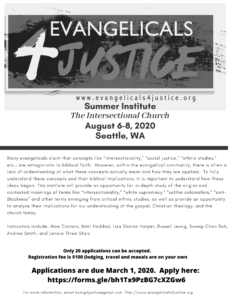Reflections on AACC’s Statement on Anti-Asian Violence and COVID-19 by Angie Hong
- Evangelicals 4 Justice
- Apr, 22, 2020
- Uncategorized
- No Comments
The Asian American Christian Collaborative has drafted a statement calling for attention to anti-Asian racism that has been hidden, invisible, and implicit. They join a long line of other organizations that have been fighting for Asian communities since the days of the Civil Rights movement, and they have brought attention to the anti-Asian sentiments during this time of COVID-19. This statement is important to consider and to sign, because combating anti-Asian racism is ultimately fighting against the colonial powers that have defined what it means to be “other,” in this case, Asian- whether it be model minority, yellow peril, exotic, and Oriental. By forming a collective, this group shows agency in how Asian and Asian American identities can be defined, free from the White Gaze. So in showing this agency, I wonder, “What/Who is Asian?”
Asians are not one thing, and we must resist the temptation to essentialize people of Asian descent. I like that the interrogation of “What/Who is Asian?” disrupts the temptation to categorize and make everyone be a static identity. If I get asked to lead worship or to speak, I am very aware that I am also being asked to lead or speak as an Asian. I am very aware that I represent Asian or Asian American? communities and underscore majority white church efforts in multiculturalism and diversity, but there is also a temptation to lock in my identity as the Asian American worship leader, or the Asian American Christian leader. This produces a static nature in which being an Asian American Christian is defined, which leads to a Neo-Orientalism and a colonial mindset.
By ignoring the particularities of who we are as God’s people and lumping all stories into a single narrative, we give into the temptation to racialize and categorize every “othered” body. Communities of color become one-line, static identities. In reality, our stories are complex, multilayered, and very fluid. For instance, when we discuss the history of Japanese Internment in the States we often separate this American injustice from Japanese imperialism and the colonization of Korea. Likewise, when we talk about the LA Riots, we separate this event from the anti-black actions perpetrated by Asian Americans in LA as well as issues of wider systemic oppression. What’s more, when we are reduced to a single narrative, we are tempted to compete with one another as POC in the “oppression Olympics.” We all miss out on seeing how much we’ve all been affected by the colonial wound.
At the end of my Asian theology studies course at Duke, our collective question was still, “What is Asian American about theology?” I hope that for many of us, we will continue to work and interrogate this question in light of our particularities and multiple realities that we live in. I believe that this interrogation seeks to heal the colonial wound and I believe it is faithful Christian practice.
By Angie Hong, Former Creative Director/ Program Lead – Chicago Campus at Willow Creek Community Church
You can read the AACC statement here.
Follow us on Twitter: @Evang4Justice
Invalid or expired token.Summer Institute

Recent Posts
- Evangelical Perspectives on Israel and Palestine – by Rob Dalrymple
- Indigenous Peoples and Christian Nationalism by Lenore Three Stars
- Recognizing Nationalism by Andrew Cheung
- Ukraine: “Wars and rumors of wars”: a sign of the times, or a sign of all times? A Christian response by Rob Dalrymple
- E4J Annual Zoom Conference: From Conflict to Community, Feb 11-12, 2022